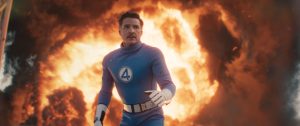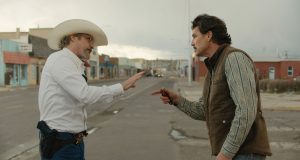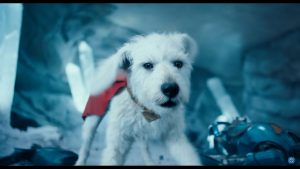Reviews include The Fantastic Four: First Steps, Marlee Matlin: Not Alone Anymore, and Oh, Hi!
An Interview With: Deragh Campbell
October 6, 2019
“Audrey has become a vessel, a tool we can use to explore different things.”
MS Slavic 7, the crown jewel of this year’s Vancouver International Film Festival’s Future/Present program, is a sly, fleet, alluringly mysterious film about family and history, intimacy and distance. It marks the most recent incarnation of Audrey, a character who has appeared in previous films (Never Eat Alone, Veslemøy’s Song) directed by Toronto’s prolific and singular Sofia Bohdanowicz and featuring actor Deragh Campbell. Campbell has played a pivotal role not only in the interpretation of Audrey, but also in the character’s very conception. With MS Slavic 7, the collaboration became so intertwined that Campbell, alongside Bohdanowicz, is credited as actor, co-scenarist, co-producer, co-editor and co-director.
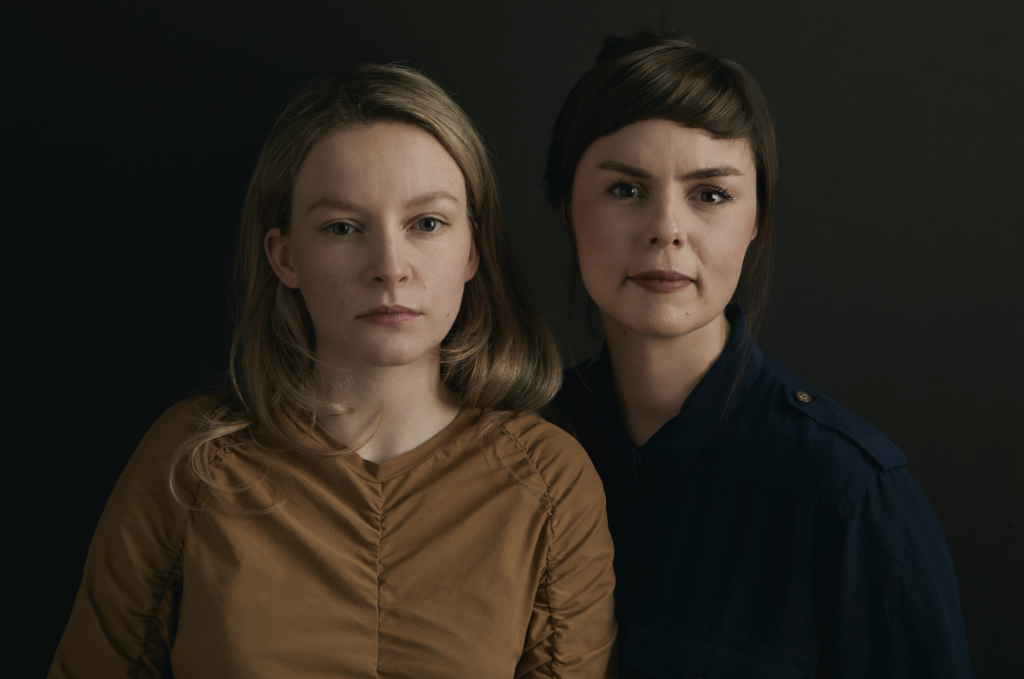
MS Slavic 7 finds Audrey traveling to Harvard University to peruse an archive containing correspondence between poets Józef Wittlin and Zofia Bohdanowiczowa, Audrey’s (and Bohdanowicz’s real-life) great-grandmother, both of whom were Poles in exile, the former in the U.S., the latter in Canada. Audrey doesn’t read Polish, yet her contact with the letters and, eventually, with the man she has translate them, reveals the degree to which she finds solace and meaning in the tactile vestiges of her familial past. Her familial present, meanwhile, is thornier, as is evidenced in scenes in which Audrey attends an anniversary party in Etobicoke and is confronted with a resentful aunt.
The film’s most captivating scenes find the socially uneasy Audrey either in solitude or negotiating shared space in the Harvard library, where she handles the letters with a quiet, rapturous focus, or in a local restaurant, where she speaks aloud her interpretation of what these letters contain and signify. These monologues represent the moments when MS Slavic 7 most obviously veers into a terrain as close to documentary as fiction, with Campbell’s thoughts and Audrey’s thoughts merging in their fascination with the importance of the letters’ “objecthood” and movement through space to reach their addressees.
Daughter to four generations of actors, Campbell was born in Toronto, grew up in Stratford and Niagara-on-the-Lake, studied creative writing in Montreal, lived for spells in London and New York, and re-settled in Toronto in 2014. Her filmography includes I Used to Be Darker, It’s Hard To Be Human, and Kazik Radwanski’s Anne at 13,000 ft., which debuted at this year’s Toronto International Film Festival, where it received an honourable mention in the Platform competition, and which also screened at VIFF. “Because I’ve only been in movies seen largely by cinephiles,” Campbell says, “it probably seems like my filmography is more curated than it actually is.” Campbell came to her family’s trade via a circuitous route, but forging her own path and becoming a pivotal figure in contemporary Canadian independent cinema has helped her occupy a space that is uniquely hers.
MS Slavic 7 will open at TIFF Bell Lightbox on October 10.
Was there a particular point in the process of making MS Slavic 7 at which it became clear that your contribution was going beyond that of an actor or co-scenarist?
Before we started shooting our roles as co-writers and co-producers were established, but I was the actor and Sofia the director. It was during the editing that Sofia came to me with the realization that, in her own words, she didn’t have all the answers. I came in and joined the editing process two days a week and two months into that Sofia proposed that we now look at the film as being co-directed. Which was very egoless of her and very empowering for me. I’m lucky that on these small, intimate projects I’ve gotten to be very involved in the development of characters. Directors will ask my opinion on a formal decision, say, which isn’t something that usually happens to actors. This isn’t something I would necessarily want on every project. I like the idea that on some projects you can just be an actor, while on others you can contribute in another way.
I find such arrangements exciting not only because it breaks down seemingly immovable hierarchies within filmmaking or the distribution of credit, but also because this approach to process yields a different product. Even if Sofia were to begin this film with the same concept, even if she were to incorporate the same elements along the way, if she was sorting it all out on her own I don’t think she would have arrived at this result. This applies to all of the Audrey films: without your extra-actorly input, Audrey might not have even become the character who eventually prompted MS Slavic 7.
I think Audrey has become a vessel, a tool we can use to explore different things. It’s become a method of channeling. In MS Slavic 7 my anxiety from university is probably informing the character, whereas in Sofia’s upcoming short film, Audrey is in the process of grieving a friend, which is something that Sofia was going through last year. The idea that both of us can reflect on different personal experiences, that we’ve created a character that is made up of different elements of two different people, is very interesting to me. I feel like you’re better equipped to tap into your instincts when you’re in dialogue with someone else, whereas when something is just coming out of your head in isolation you can feel very self-conscious. You can shake off some of the desire to impress someone with a polished idea when you’re in conversational mode.
When you introduced the film here in Vancouver you described it as being very earnest, which struck me as curious. I get it in the sense that Audrey is, in her way, earnest, and the viewer’s perspective is closely hewed to hers. But I’d argue that, in another way, the film is anything but earnest. It conceals and reveals things at strategic moments. It’s playful and even cryptic. I’ve seen it twice now and still find it mysterious.
I guess I think of Audrey as earnest in her desire to understand things and articulate herself. But that desire is so strong that it inhibits her. That’s actually, for me, the link between my characters in MS Slavic 7 and Anne at 13,000 ft., this desire for experience and meaning being so powerful as to get in one’s way. Maybe if Audrey could relax a little, if she wasn’t so desperate to understand the letters, she would be open to a more emotional experience of them. Just as Anne might be able to get closer to others if she could just stop and truly listen to them for a moment, rather than feel obligated to perform for them, to amp up every interaction. I think Audrey really believes it’s through research that she can become closer to her great-grandmother. If she can articulate her findings, maybe she can connect. I think this is what drives a lot of art, the feeling that if I find a way to really say what I feel then I can connect to others and feel understood.
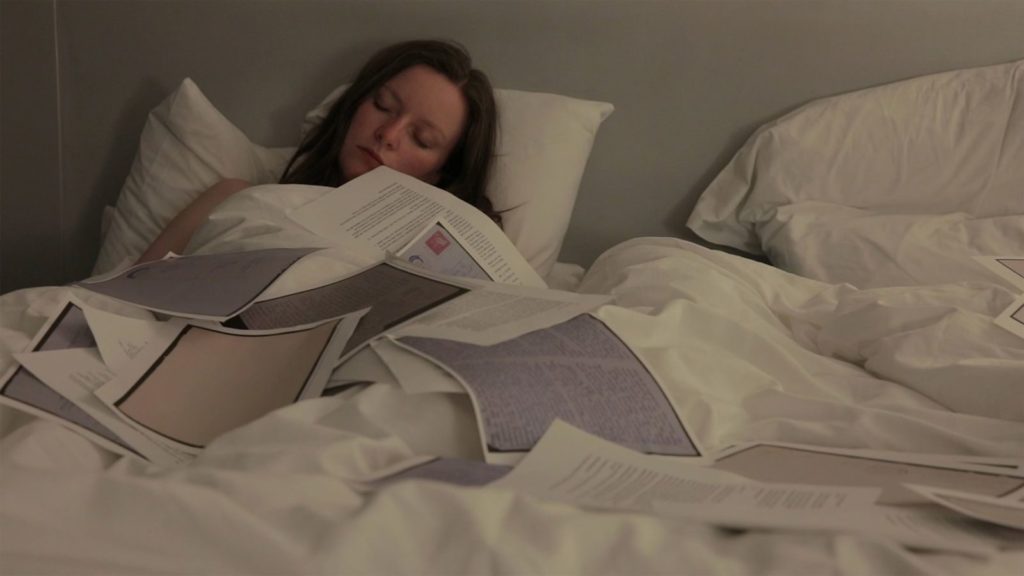
In Audrey’s first monologue she talks about the meaning of the letters as being inextricable from their materiality. In the first scene in the archive we see Audrey handling the letters in this very exploratory way, folding and unfolding them, and then these superimposed titles appear, fragments of the letters in translation, like subtitles except no one is speaking. Initially I was wondering if Audrey was gleaning the letters’ contents by osmosis.
[Laughs] Maybe to some extent she is.
I’m just thinking about this idea of things you can touch, how we spend time watching Audrey touching these letters whose words she can’t read, while later in the story we learn she’s become intimate with someone we never she her touch. Did you and Sofia talk about the contrast between Audrey’s relationship to objects and to people?
We’re definitely talking about her relationship to people. There is a goal that in the next film she’ll finally get a friend. [Laughs] We also talked about the difference between Audrey’s body language in the first two monologues and the third, where we see her addressing another person, which makes her more self-conscious. We see Audrey’s flow of thoughts being interrupted by having to reckon with another person. Interacting with others is really hard for her because her sense of identity only works in isolation. She has to come to her conclusions privately and then present them to others. I sympathize with this pretty strongly. I think she feels at peace with the letters because they don’t change or react. They’re things she can react to.
When I first saw MS Slavic 7 I thought Audrey’s first monologue was perhaps you, Deragh, talking to Sofia. It’s only during the third monologue that we realize she’s addressing the translator. Can you talk about the decision to reveal the translator so late in the story?
In my mind he’s not there for the first two monologues, only the third. But I like hearing people’s responses and learning how the monologues can be read in many different ways. Something that I find really interesting with cinema is that, unless you create these foggy edges to imply a dream sequence, whatever you show on screen is real. Because Audrey is sitting at a table speaking outwardly, we assume this is literally what’s happening. I thought of those first two monologues as a kind of abstract representation of her notebook or thought process. I like how cinema allows you to create a moment that’s abstract and actual at the same time. You can’t choose for it to be one or the other. It’s kind of both and neither. I was an avid reader before I became an avid film-watcher, so these questions remind me of things Anne Carson might do, for example. In Autobiography of Red you don’t know whether this character is actually a dragon or the dragon is just a metaphor. Not forcing that decision is an interesting way to hold tension.
MS Slavic 7 is in part about finding one’s place in the larger story of a family. And it deals specifically with an artistic legacy spanning generations. I wonder how this question has played out in your own life. You come from a long line of actors. I know you’ve felt considerable ambivalence toward acting. Is it a vocation you wanted to avoid because of your family? Was there a formative experience that prompted you to explore the practice on your own terms?
It’s been gradual. I wasn’t pursuing acting. Then I was cast in I Used to Be Darker and it was just as I was about to complete my creative writing degree that I got the call telling me the film got into Sundance. That felt like this sharp break between my writing life and my acting life. Yet through my acting work I’ve gradually come back to writing, because even as early as Stinking Heaven I was already writing with the director. It was never that I felt I was contending with my family and their accomplishments in any direct way, but I think I just felt lost as an actor for a long time. I was given some praise early on for being natural on camera, which was funny because I was being such a smaller, quieter version of myself. It’s only with these last three features, Fail to Appear, MS Slavic 7 and Anne at 13,000 ft., that I feel I’ve been able to be less internal. I think I’ve relaxed enough to show more variety in my face and body than before. It was very moving and meaningful to me when my parents came to see Anne and my father made comments on my work and I realized that I’d slowly began to develop my own acting style independent of my parents’ work. I’m now feeling quite excited about acting for the first time.
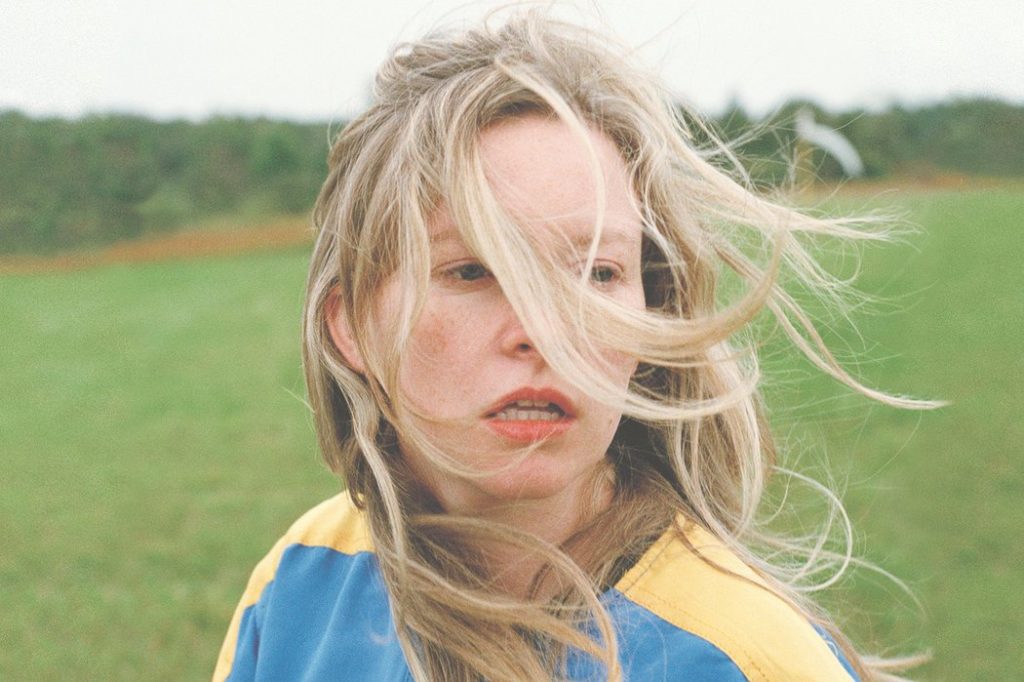
Did you do it as a kid?
No. I mean, I was never in professional productions. I wrote and directed my own little plays. Sometimes we would run down to the Stratford Festival after the plays let out and handed out flyers saying that the children of the actors in the production are putting on a play. People would then leave the theatre and come watch us kids do a play on our front porch.
Did your parents encourage you to act?
Not in any pressuring kind of way. I think my mom was actually very excited about me being a writer and having more agency in my creative life. But I think that by this point she’s really proud of the film community that I’ve helped build with others. So many actors have this existence where it’s about them and their management. Their success is entirely about them. For me, success has been about a community, something we built together. It’s not about the success of any one person. It’s unusual for actor, more sustainable and more satisfying.
I can only imagine that working with Sofia on MS Slavic 7 and Kaz on Anne at 13,000 ft. would offer two very different exchanges and challenges. Do you feel you’re exercising different muscles when working with these different directors?
There are similarities in the sense that both give me some authority over what’s happening in front of the camera. The biggest difference comes from the scenarios that Sofia has proposed, or that we’ve proposed together, and the ones that Kaz proposes. Sofia and I are very communicative. We have a shorthand around, say, whether we have the shot. We’re very quick with regards to sorting out whether we have what we need. With Kaz it’s a bit more delineated. We might be working and I’ll spend ten minutes interacting with what’s in the space without knowing if what we just did will wind up in the film or, if so, how it will be cut together. There’s a necessary trust there. I’m less involved in those decisions—which is a given, since I’m co-director of one film and not the other. With Audrey it’s about control and with Anne it’s about abandon. I was thinking about how, while working on Anne, some days I would show up on set feeling emotionally available and others less so. Unlike a trained actor I don’t have a lot of tricks, so sometimes I can get there and sometimes I can’t. But that’s kind of how anxiety works. Some days you’re volatile and others you’re numb. There’s an inner struggle to break out of yourself.
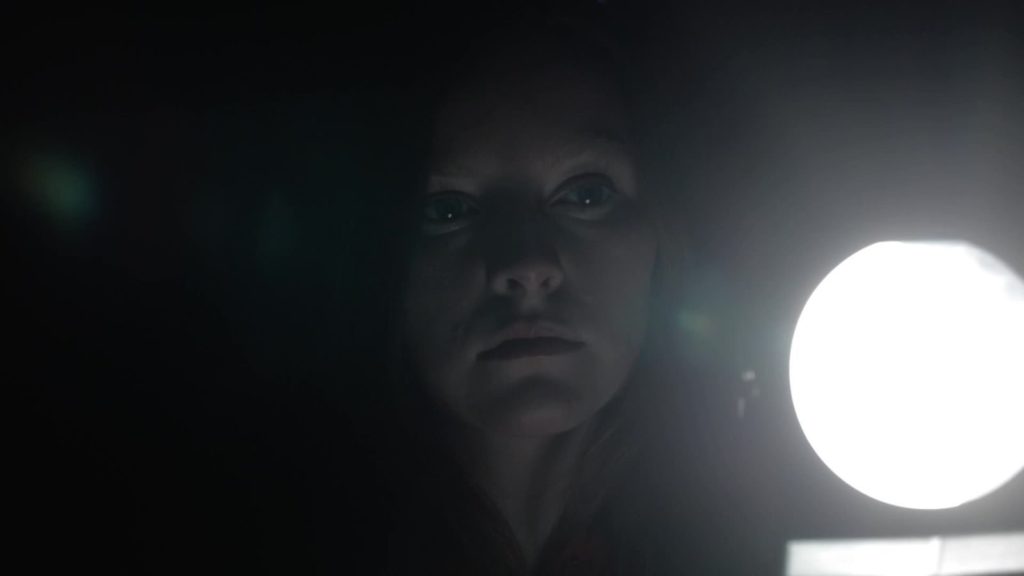
Was the process of making Anne more anxiogenic that that of MS Slavic 7?
Oh, certainly. MS Slavic 7 is where I’m the most comfortable. So often when acting you can feel that you’re failing. You can get too concerned with pleasing the director. Sofia is the least judgmental person in the world. She creates a space where you’re not thinking about those things. It’s also just a question of the material. Those monologues regarding the letters are pretty much my own thought process. I’m happiest when I’m reading, while I’m probably least happy in social interactions and situations I can’t control. I almost wonder if a project like Anne at 13,000 ft. doesn’t favour untrained actors because my process was so much less about sculpting a moment that just offering responses that [editor] Ajla [Odobasic] and Kaz will later sculpt in the edit. It’s more about acting as generating material for others to build a character from. Which I find extremely interesting. I admire it and feel lucky to be part of it. But, it’s more anxiety-producing, for sure.
You didn’t train as an actor. Which makes me think about that funny, tense scene in MS Slavic 7 where Audrey’s aunt flips out over the idea of someone becoming a curator without receiving years of training first. Do you ever feel like you might want to get some training as an actor? Or do you feel you’re getting everything you need just through doing it?
That’s a very interesting question. I probably won’t get any training just because I hate school so much. Though I probably have fewer issues with authority than when I was younger. Back then if I thought what someone was asking me to do was stupid I just wouldn’t do it. I wonder if that wasn’t a way for me to be lazy and avoid things that might be difficult. All I can say is that right now I feel that I’ve arrived at a new place, building a character by placing myself in a situation and allowing myself to react, to be as present in the given circumstances as possible. That’s what I’m most interested in exploring. Maybe at some point there will be a limit to how interesting I find that or how much I can grow as an actor by doing that. Maybe at that point it will become important to explore other types of acting. But for the moment I feel pretty good about just throwing myself into these different situations and responding with the tools I’m been developing little by little, one film at a time, one challenge at a time.
Interview by José Teodoro

